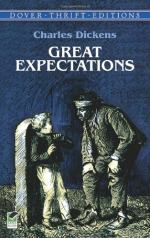At certain times — meaning at uncertain times, for they depended on our humour — I would say to Herbert, as if it were a remarkable discovery:
“My dear Herbert, we are getting on badly.”
“My dear Handel,” Herbert would say to me, in all sincerity, if you will believe me, those very words were on my lips, by a strange coincidence.”
“Then, Herbert,” I would respond, “let us look into out affairs.”
We always derived profound satisfaction from making an appointment for this purpose. I always thought this was business, this was the way to confront the thing, this was the way to take the foe by the throat. And I know Herbert thought so too.
We ordered something rather special for dinner, with a bottle of something similarly out of the common way, in order that our minds might be fortified for the occasion, and we might come well up to the mark. Dinner over, we produced a bundle of pens, a copious supply of ink, and a goodly show of writing and blotting paper. For, there was something very comfortable in having plenty of stationery.
I would then take a sheet of paper, and write across the top of it, in a neat hand, the heading, “Memorandum of Pip’s debts;” with Barnard’s Inn and the date very carefully added. Herbert would also take a sheet of paper, and write across it with similar formalities, “Memorandum of Herbert’s debts.”
Each of us would then refer to a confused heap of papers at his side, which had been thrown into drawers, worn into holes in Pockets, half-burnt in lighting candles, stuck for weeks into the looking-glass, and otherwise damaged. The sound of our pens going, refreshed us exceedingly, insomuch that I sometimes found it difficult to distinguish between this edifying business proceeding and actually paying the money. In point of meritorious character, the two things seemed about equal.
When we had written a little while, I would ask Herbert how he got on? Herbert probably would have been scratching his head in a most rueful manner at the sight of his accumulating figures.
“They are mounting up, Handel,” Herbert would say; “upon my life, they are mounting up.”
“Be firm, Herbert,” I would retort, plying my own pen with great assiduity. “Look the thing in the face. Look into your affairs. Stare them out of countenance.”
“So I would, Handel, only they are staring me out of countenance.”
However, my determined manner would have its effect, and Herbert would fall to work again. After a time he would give up once more, on the plea that he had not got Cobbs’s bill, or Lobbs’s, or Nobbs’s, as the case might be.
“Then, Herbert, estimate; estimate it in round numbers, and put it down.”
“What a fellow of resource you are!” my friend would reply, with admiration. “Really your business powers are very remarkable.”




